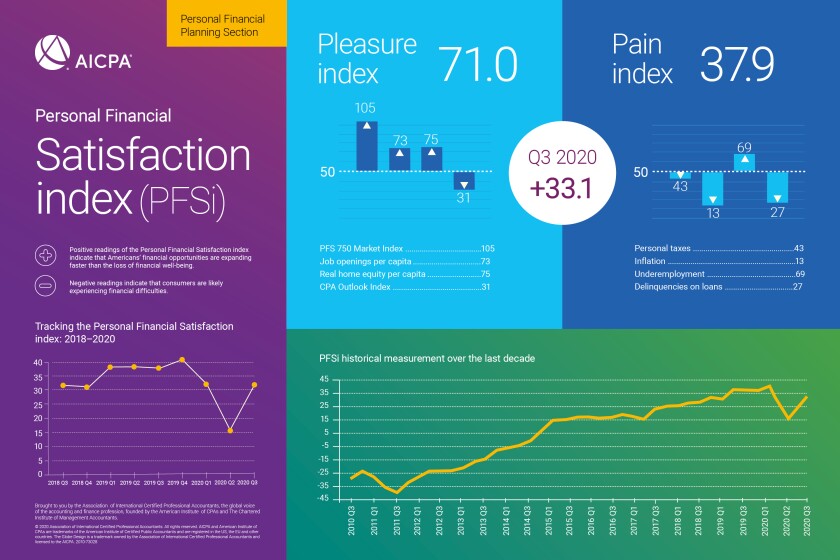Financial satisfaction of people in the U.S. rebounded strongly in the third quarter of the year, according to a new survey by the American Institute of CPAs, reversing the lows in the second quarter in the midst of the recession brought on by the novel coronavirus pandemic.
The AICPA’s Q3 2020 Personal Financial Satisfaction Index measured 33.1, representing a whopping 99 percent (16.5 point) increase from the previous quarter. That’s the biggest quarterly increase in the 27-year history of the PFSi, and a complete turnaround from the second quarter, when the index had its largest ever quarterly drop.
Noah Gold is the general counsel and head of public policy of Prism Data, a cash flow underwriting infrastructure and analytics platform. Prior to joining Prism, he was the general counsel of Petal, a fintech credit card company. Before that, he was the assistant general counsel of a leading e-commerce software platform, and prior to that Noah previously practiced law at Paul, Weiss, Rifkind, Wharton & Garrison LLP.
Jason Rosen is founder and CEO of Prism Data, a cash flow underwriting infrastructure and analytics platform. Prior to founding Prism, Jason was co-founder and CEO of Petal, a fintech credit card company. Jason served on the Consumer Advisory Board of the Consumer Financial Protection Bureau, sat on the Small Business Regulatory Enforcement Fairness Act panel for the Open Banking rulemaking, and is a member of the OCC's Project REACh. Jason previously practiced law at Sullivan & Cromwell and Gunderson Dettmer, where he represented financial institutions, technology companies and venture capitalists. Jason holds a JD from Harvard Law School.
Dev Nag is the founder and CEO of QueryPal. He was previously on the founding team at GLMX, one of the largest electronic securities trading platforms in the money markets. He was also CTO and founder at Wavefront (acquired by VMware) and a senior engineer at Google, where he helped develop the back end for all financial processing of Google ad revenue. He previously served as the manager of business operations strategy at PayPal. He also launched eBay's private-label credit line in association with GE Financial. Dev received a dual-degree B.S. in mathematics and B.A. in psychology from Stanford.
The PFSi is built around various factors, including the labor market. The gains can be mainly attributed to improvements in job openings per capita and underemployment. Those had the biggest impact on increasing the overall PFSi. The biggest factor driving the quarter-over-quarter rally was a 35 percent (37 point) decrease in underemployment. A decrease in underemployment improves overall financial satisfaction in the index. While there was an improvement in underemployment in the third quarter from Q2’s record high, it’s still 117 percent above its level a year ago. For the second consecutive quarter, underemployment is still the biggest negative contributor to the average American’s personal financial satisfaction. The Q3 underemployment level reflects data measured through the middle of September.
“As Americans continue to navigate the economic impact of the COVID-19 pandemic, it is important to remember that the fundamentals of financial planning haven’t changed,” said AICPA PFS Credential Committee chair Dave Stolz in a statement Thursday. “Though the stock market’s record performance is encouraging, 2020 has served as a reminder of the volatile nature of markets. As the impact of COVID-19 continues to play out across the country, investors should weigh their risk tolerance and ensure they have ample cash on hand. Further, a tax-efficient financial plan that includes a diversified portfolio can give confidence that long-term financial goals will remain within reach through this period of extreme uncertainty.”
The coronavirus put millions out of work, prompting job openings per capita to show a record plummet earlier this year. In the third quarter, job openings started to recover, climbing 37 percent (20 points) compared to Q2. That factor is now only 10 percent below its measurement a year ago before the pandemic. The Q3 index comes from July data from the U.S. Bureau of Labor Statistics.




